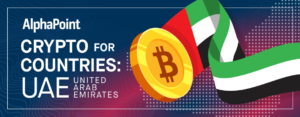Crypto as a Service (CaaS): Key Benefits, Providers, and Use Cases
Dive into CaaS with our guide. Discover insights, benefits, and challenges for informed crypto decisions.

The Rise of Cryptocurrency in the UAE
The Middle East is gaining significance in the world of cryptocurrency. This is because the UAE and Bahrain have implemented regulations to foster the use of cryptocurrency in the region.
The UAE government supports the use of digital assets to assist in their global development. Currently, 35% of people in the country are cryptocurrency owners. Needless to say, there is an expected increase in adoption in the coming years.
According to Chainalysis, the UAE accounts for 7% of global trading volume and $25 billion in transactions. It’s a rapidly growing crypto market, with its global market share growing 500% from July 2020 to June 2021.
UAE Fosters Worldwide Growth
The UAE wants to attract foreign investors and entrepreneurs in its digital asset industry by creating free-trade zones. The goal is to increase the use of digital asset usage in the country. In these zones, entrepreneurs can have full ownership of their businesses and operate under different rules and taxes.
Ras Al Khaimah, located in the northern territory of the UAE, has introduced new crypto concepts. These concepts aim to attract virtual asset providers who specialize in advanced technology solutions. These solutions include areas such as metaverse, web3, NFTs, and more. Between 2020 and 2022, there was a 400% increase in the number of claimed crypto businesses.
Building a Crypto-Friendly Ecosystem: Key Initiatives and Regulations
Dubai has two main laws for crypto usage: VAL and VARA. They both established regulations for virtual assets in the city.
On Feb 28, 2022, Dubai passed VAL, its initial crypto law, aimed to safeguard investors and oversee digital currencies. On the other hand, VARA regulates the sale of virtual assets and tokens, authorizes providers, and protects investor data.
Currently, the DFSA is creating rules for cryptocurrency businesses in the DIFC, Dubai’s financial center. The DFSA is working with businesses in the Financial Center to help increase the use of cryptocurrency in the country.
Nurturing Innovation: Education Programs and Cryptocurrency Payments
The MENA region has seen a significant increase of 300% in educational programs and workshops on blockchain. These programs and workshops focus on the Middle East, North Africa, and South Asia. The educational rise has occurred simultaneously with the growth of commercial tech sectors in the region.
In Dubai, students can use cryptocurrency as an innovative way to pay for their education. To set the precedent, at Citizens School students are able to use this method through a civic program. An e-currency platform has been enabling seamless cryptocurrency payments since September 2022, automatically converting cryptocurrencies into dirhams (AED). By implementing this innovative payment system, the country is preparing its youth for the new digital ecosystem.
Furthermore, Bybit and AUS are working together to promote cryptocurrency use and educate people about blockchain in the UAE. The partnership offers scholarships and hackathon opportunities to provide students with the necessary skill sets to understand how the crypto industry works. Bybit, the third-largest crypto exchange, has donated AED 1,000,000 for the scholarship. The scholarship aims to support 20 students in pursuing careers in blockchain and fintech.
Growth Potential: Preparing For The Future
The UAE is ranking as one of the most prominent places for a surge in crypto innovation. Dubai has 722 crypto companies and is in need of industry professionals to meet the high job demand. Bybit and the AUS partnership aim to connect blockchain professionals seeking to have a worldwide influence in the changing crypto industry.
Teaching students about digital assets and finance helps them understand how cryptocurrency is changing their economy and allowing for financial freedom. The hackathons provided by the partnership will also allow students to learn from one another and adapt key industry skill sets. Through innovation, financial support, and willingness to learn, the UAE is creating skilled professionals for the new digital age.
Blockchain Technology: Top 11 Cryptocurrency Wallets
Per Techopedia, the following are the top 11 cryptocurrency wallets for UAE traders: Best Wallet, eToro, Binance, Trezor, Trust Wallet, MetaMask, Coinbase Wallet, Ledger Nano, OKX, Electrum, and MyEtherWallet.
The top wallet is ‘Best Wallet’ due to its advanced security and AI features. Through this wallet, traders are able to view their crypto portfolios in real time. The innovative wallet also allows users to stay updated on new crypto launches that are best suited for their digital needs.
Cryptocurrency: Global Impact
The UAE’s Central Bank does not recognize cryptocurrencies as official currency. However, the country is promoting the usage of digital assets and implementing new tactics to enhance the economy. Additionally, they aim to establish a solid understanding of cryptocurrencies through carefully curated educational programs throughout the country.
El Salvador and the Central African Republic have accepted bitcoin as legal tender and set the precedent for crypto’s global impact. The Middle East may also be considering using cryptocurrency as a national currency and make changes in global financial systems.
Dive into CaaS with our guide. Discover insights, benefits, and challenges for informed crypto decisions.
Over the last 15 years, blockchain and its associated technology have become widely known, accepted, and most importantly, trusted by crypto investors and enthusiasts. The use of exchanges, wallets, and other online platforms to transact crypto has grown. Unfortunately, so has the volume and sophistication of attackers interested in gaining unauthorized access, disrupting transactions, and […]
AlphaPoint celebrates 11-years as the leading provider of white label digital asset infrastructure.
Unbanked populations don’t just exist in underdeveloped countries. People without access to basic financial services also live in industrialized countries like the United States. Recent data shows that at least 6 million people in the U.S. are unbanked, as well as over 1 billion people across the globe. Financial exclusion leads to widespread issues like […]